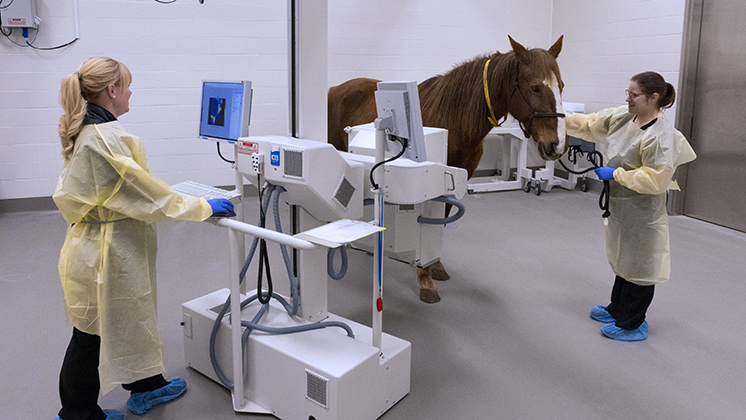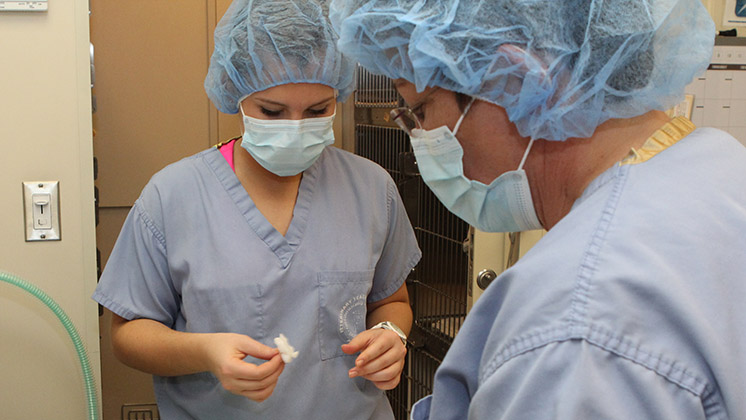How Do I Choose the Right Vet Tech Program for Me?

by Kelsey Wirt, MS, LVT and Josh L. Clark, MS, RVT
Choosing the right program is a crucial step in your journey towards this rewarding career. The program you choose can significantly influence your educational experience, preparation for credentialing, and future job prospects. Here are some factors to consider when choosing a vet tech program.
Accreditation
First and foremost, ensure the program is accredited by the American Veterinary Medical Association (AVMA). Accreditation ensures the program meets specific standards in curriculum, faculty, facilities, and student outcomes. Most states require graduation from an AVMA accredited program to be eligible to sit for the Veterinary Technician National Examination (VTNE). Read more about AVMA accredited vet tech programs.
Curriculum and Instructors
While AVMA accredited programs do have to include standard topics in their curriculum, not all curriculums are created equally. Each program has the ability to emphasize additional or specific areas of veterinary medicine in their curriculum. Program instructors also play an important part in delivering a program’s curriculum. It can be helpful to learn more about the team of instructors at a program before you make a decision.
Clinical Experience
Hands-on clinical experience is vital for a vet tech. Most programs provide a combination of hands-on learning in laboratory situations and real world experience in the form of completing off-campus experiences such as practicums or externships. Purdue's Veterinary Technology programs provide extensive hands-on experience to prepare you for your future career.
Pass Rates for the VTNE
The AVMA requires accredited vet tech programs to publicize their three-year average VTNE pass rates for graduates on their first attempt. Because of this, it is important to check the school's pass rates for the VTNE. A high pass rate indicates that the program effectively prepares its students for this critical exam in order to become a credentialed veterinary technician. Compare Purdue's three-year VTNE pass rates to the national average.
Passing the VTNE is the only way for you to become a credentialed veterinary technician/nurse. Read more about the VTNE and why it matters.
Cost and Financial Aid
Consider the cost of the program and the availability of financial aid. While cost should not be the only factor, it's essential to consider your budget. There can be a wide range in tuition rates between programs. For example, a program offered through a community college would typically be less expensive than a program offered through a university.
Location and Format
Think about the school's location and the format of the classes. For some, attending an in-person program isn’t an option because there is not a AVMA accredited program within a close proximity. Another aspect to consider is your learning style. There are pros and cons to both in-person and distance learning programs. Read more about in-person programs or read more about distance learning programs.
Student Reviews and Testimonials
Look for reviews and testimonials from past students. They can provide insights into the strengths and weaknesses of the program.
Remember, the right vet tech program for you depends on your personal goals, circumstances, and preferences. Take the time to research multiple programs, ask questions, and weigh your options carefully.
Start Your Veterinary Technician Journey
Find your calling as a Purdue Veterinary Technician!
Not quite ready to apply? Connect with us to learn more.
Suggested Articles

How Long Does It Take to Become a Vet Tech/Nurse?
Becoming a veterinary technician requires several steps, each of which takes a certain amount of time. Let's explore the journey and timeline for aspiring vet techs.
Read more
How Do I Get a Raise as a Vet Tech?
Discover actionable steps for veterinary technicians to boost their earning potential. From pursuing specialization to effective negotiation, learn how to highlight your value in the veterinary field and advocate for a salary that matches your skills and contributions.
Read more
Does a Vet Tech Degree Help Me Become a Veterinarian?
Learn whether a vet tech degree can serve as valuable experience for aspiring veterinarians.
Read more
